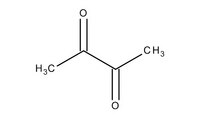803528 Sigma-AldrichDiacetyl
Diacetyl for synthesis. CAS 431-03-8, chemical formula CH₃COCOCH₃.
More>> Diacetyl for synthesis. CAS 431-03-8, chemical formula CH₃COCOCH₃. Less<<Synonyms: 2,3-Butanedione, 2,3-Butadione, Dimethyldiketon, Dimethylglyoxal
Recommended Products
Overview
| Replacement Information |
|---|
Key Spec Table
| CAS # | EC Number | Hill Formula | Chemical Formula | Molar Mass |
|---|---|---|---|---|
| 431-03-8 | 207-069-8 | C₄H₆O₂ | CH₃COCOCH₃ | 86.09 g/mol |
Products
| Catalogue Number | Packaging | Qty/Pack | |
|---|---|---|---|
| 8035280002 | Glass bottle | 2 ml | |
| 8035280100 | Alu bottle | 100 ml | |
| 8035280250 | Alu bottle | 250 ml |
| Description | |
|---|---|
| Catalogue Number | 803528 |
| Synonyms | 2,3-Butanedione, 2,3-Butadione, Dimethyldiketon, Dimethylglyoxal |
| Description | Diacetyl |
| References |
|---|
| Product Information | |
|---|---|
| CAS number | 431-03-8 |
| EC number | 207-069-8 |
| Hill Formula | C₄H₆O₂ |
| Chemical formula | CH₃COCOCH₃ |
| Molar Mass | 86.09 g/mol |
| HS Code | 2914 19 23 |
| Structure formula Image | |
| Quality Level | MQ200 |
| Applications | |
|---|---|
| Application | Diacetyl for synthesis. CAS 431-03-8, chemical formula CH₃COCOCH₃. |
| Biological Information |
|---|
| Dimensions |
|---|
| Materials Information |
|---|
| Toxicological Information | |
|---|---|
| LD 50 oral | LD50 Rat 1580 mg/kg |
| LD 50 dermal | LD50 Rabbit > 5000 mg/kg |
| Safety Information | |
|---|---|
| Categories of danger | highly flammable, harmful, irritant |
| Product Usage Statements |
|---|
| Storage and Shipping Information | |
|---|---|
| Storage | Store at +2°C to +8°C. |
| Packaging Information |
|---|
| Transport Information | |
|---|---|
| Declaration (railroad and road) ADR, RID | UN 2346 , 3, II |
| Declaration (transport by air) IATA-DGR | UN 2346 , 3, II |
| Declaration (transport by sea) IMDG-Code | UN 2346 , 3, II |
| Supplemental Information |
|---|
| Specifications | |
|---|---|
| Assay (GC, area%) | ≥ 97.0 % (a/a) |
| Density (d 20 °C/ 4 °C) | 0.984 - 0.988 |
| Identity (IR) | passes test |
| Global Trade Item Number | |
|---|---|
| Catalogue Number | GTIN |
| 8035280002 | 04027269277802 |
| 8035280100 | 04022536381732 |
| 8035280250 | 04022536381749 |
Documentation
Diacetyl SDS
| Title |
|---|
Diacetyl Certificates of Analysis
| Product Number | Packaging | Specification | Lot Number |
|---|---|---|---|
| 8035280002 | Glass bottle | PDF Specification Document | |
| 8035280100 | Alu bottle | PDF Specification Document | |
| 8035280250 | Alu bottle | PDF Specification Document |











